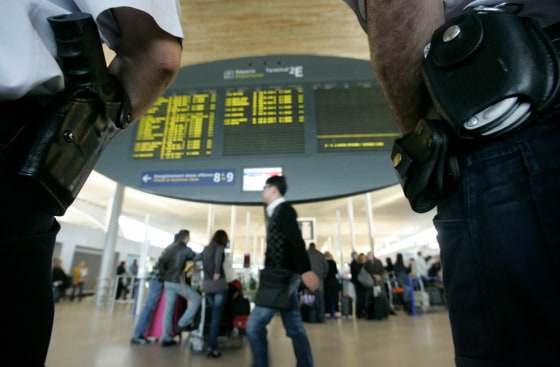The U.S. State Department on Sunday will issue a travel "alert" urging American citizens to be vigilant as they travel in Europe, government officials told NBC News on Saturday.
The alert is due to new al-Qaida threats although officials have not identified specific targets that terrorists might be considering, NBC News said.
Senior U.S. diplomats who report to Secretary of State Hillary Clinton met in Washington Saturday today to discuss the wording, The Sunday Telegraph of London reported.
Such a move could have significant implications for European tourism.
The alert is expected to advise U.S. travelers to deploy extra caution when visiting tourist destinations, transport hubs and other likely terror targets, The Sunday Telegraph said.
The State Department is not expected to issue a warning advising Americans against travel to Europe, the newspaper said. However, officials from Britain and other major European countries have been briefed on the alert, it said.
"This travel alert is a cumulative result of information we have received over an extended period," one senior administration official said. "We are constantly monitoring a range of threat streams and have monitored this and others for some time."
State Department spokesman P.J. Crowley declined to comment on the matter. But he told The Associated Press the administration remains focused on al-Qaida threats to U.S. interests and will take appropriate steps to protect Americans.
A European official briefed on the talks said the language in the U.S. alert is expected to be vague. It won't address a specific country or specific landmarks, the official said.
Officials have called the threat credible but not specific.
The U.S. has told European leaders that the State Department alert would be intended to raise the warning level to match the information about the would-be attack that surfaced last week, a European official said.
The European official said there had not been strong opposition to the proposed alert from European leaders.
On Friday, Sweden announced it raised its threat alert to the highest level ever because of an increased threat of terror attacks. But Swedish security officials said there did not appear to be an immediate threat, nor did they cite any possible targets. In Britain, the security level stood at "severe" — the second highest in a five-step scale — and there were no plans of raising it further, according to a British security official, who spoke on condition of anonymity because of the sensitivity of the issue.
Behind plots: Al-Qaida
Intelligence officials believe Osama bin Laden is behind the terror plots to attack several European cities. If this is true, this would be the most operational role that bin Laden has played in plotting attacks since Sept. 11, 2001.
Eight Germans and two British brothers are at the heart of an al-Qaida-linked terror plot against European cities, but the plan is still in its early stages, with the suspects calling acquaintances in Europe to plan logistics, a Pakistani intelligence official said Thursday.
One of the Britons died in a recent CIA missile strike, he said. The Pakistani official said the suspects are hiding in North Waziristan, a Pakistani tribal region where militancy is rife and where the U.S. has focused many of its drone-fired missile strikes.
"We remain focused on al-Qaida's interest in attacking us and attacking our allies," Crowley said. "We will do everything possible to thwart them and will take steps as appropriate."
The Pentagon declined to say Saturday whether it had increased security levels at any of its European bases.
The implications of a blanket "travel warning" instead of an alert would be big. There are hundreds of thousands of Americans in Europe at any one time, including tourists, students and businesspeople.
While the government cannot stop people from traveling there or force them to return home, a warning would result in canceled airline and hotel bookings as well as deter non-U.S. travelers from going to Europe. In addition, many U.S. college and university study-abroad programs will not send students to countries for which a warning is in place for insurance and liability reasons.
For that reason, officials said, there was internal debate over how strong to make the warning. The State Department has several grades of travel notice, ranging from low-threat advisories to more severe alerts and a formal "travel warning." There is also a "worldwide caution" in place that warns Americans of ongoing global terrorist threats.
Some U.S. allies in Europe have expressed concern about the proposed warning, saying it is an overreaction to the threat information, a position shared by some in the administration, the officials said.
Under a "no double standard" rule adopted after the 1998 bombings of the U.S. embassies in Kenya and Tanzania, the government is obliged to share threat information that it has given diplomats and other officials with the general public.
